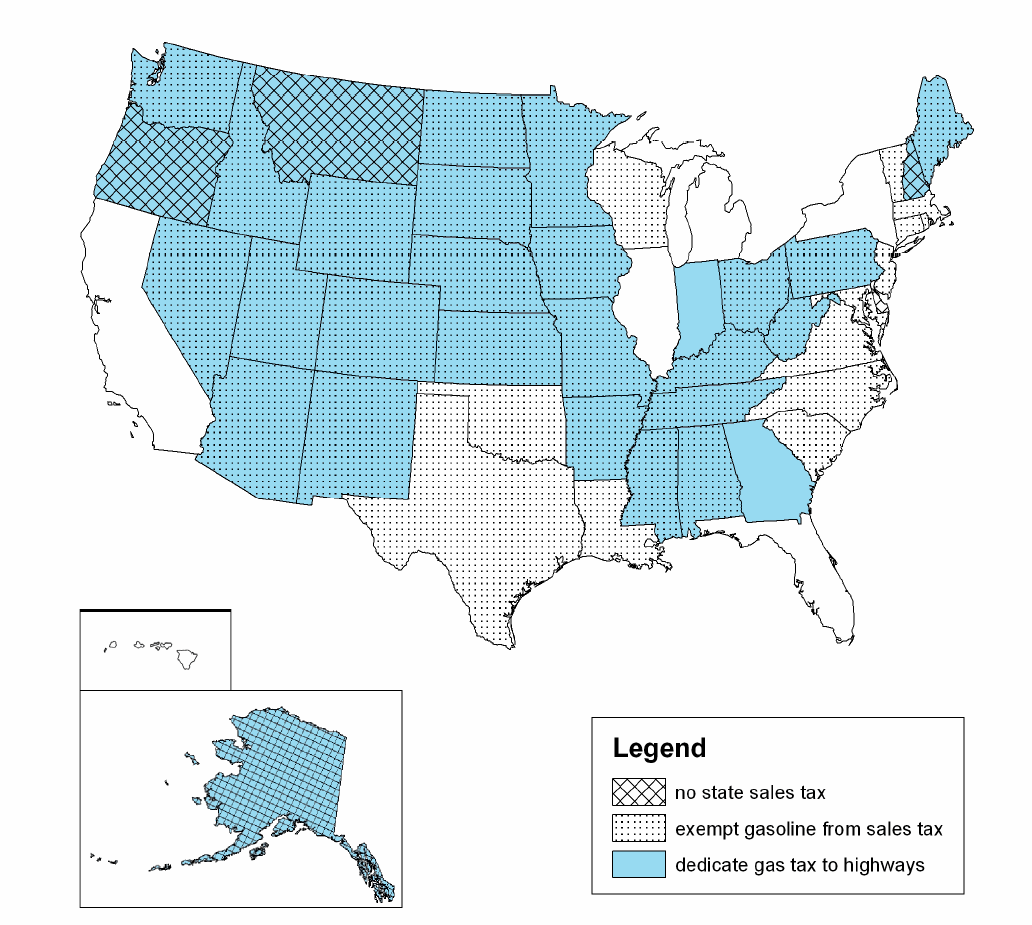U.S. PIRG
Executive Summary
Highway advocates often claim that roads “pay for themselves,” with gasoline taxes and other charges to motorists covering—or nearly covering— the full cost of highway construction and maintenance.
They are wrong.
Highways do not—and, except for brief periods in our nation’s history—never have paid for themselves through the taxes that highway advocates label “user fees.” Yet highway advocates continue to suggest they do in an attempt to secure preferential access to scarce public resources and to shape how those resources are spent.
To have a meaningful national debate over transportation policy—particularly at a time of tight public budgets—it is important to get past the myths and address the real, difficult choices America must make for the 21st century.
Gasoline taxes aren’t “user fees.”
Highway advocates often describe gasoline taxes as “user fees” in order to argue that those funds should be used only on highways. Yet, gasoline taxes are not user fees in any meaningful sense of the term.
- “Fees” are not connected to “use” – The amount of money a particular driver pays in gasoline taxes bears little relationship to his or her use of roads funded by gas taxes—unlike other true user fees such as admission fees for state parks or turnpike tolls. Drivers on local streets and roads, for example, pay gasoline taxes for the miles they drive on those roads, even though those taxes are typically used to pay for state and federal highways. Efforts to ensure that residents of a given area “get back” what they pay in gasoline taxes—such as the federal equity bonus program—actually perpetuate wasteful pork-barrel spending since they allocate money with no consideration of need or the benefits those investments would deliver to society.
- State gas taxes are often not entirely “extra” fees – Most states exempt gasoline from the state sales tax. The substitution of the gasoline tax for the sales tax diverts much of the money that would have gone into a state’s general fund to a fund used often for the exclusive benefit of drivers. In some states, such as New Jersey, the gasoline tax is at times lower than the corresponding sales tax would be, meaning that drivers get a net tax subsidy that encourages the purchase of gasoline relative to other goods.
- Federal gas taxes have typically not been devoted exclusively to highways – The federal gas tax began its life as a deficit-fighting measure under President Herbert Hoover decades before the Interstate Highway System. Only during a brief 17-year period beginning in 1956 did Congress temporarily dedicate gas tax revenues to construct the Interstate network, a project completed in the 1990s. Since 1973, the gasoline tax has been used to fund a variety of important transportation priorities and has periodically been used to reduce the federal deficit.
- Many states use gas tax revenue for a variety of purposes – While many states have historically dedicated their own state gasoline taxes to highways, that decision has not been universal. According to Federal Highway Administration data, roughly 20 cents of every dollar collected in state gas taxes, motor vehicle fees or tolls nationwide is used for public transportation and other governmental purposes. Many of the states that do use gasoline taxes solely for highways do so because they remain bound by constitutional earmarks of gasoline taxes imposed as much as three-quarters of a century ago, regardless of whether those decisions still make sense today.
Highways don’t pay for themselves.
- Since 1947, the amount of money spent on highways, roads and streets has exceeded the amount raised through gasoline taxes and other so-called “user fees” by $600 billion (2005 dollars), representing a massive transfer of general government funds to highways.
- Highways “pay for themselves” less today than ever. Currently, highway “user fees” pay only about half the cost of building and maintaining the nation’s network of highways, roads and streets.
- These figures fail to include the many costs imposed by highway construction on non-users of the system, including damage to the environment and public health and encouragement of sprawling forms of development that impose major costs on the environment and government finances.
- New or expanded highways are even less likely to pay for themselves in the future as changing demographic conditions and consumer choices limit the growth in vehicle travel and fuel use that would otherwise provide the revenue for a major program of highway expansion.
Highway advocates use the “user fees/highways pay for themselves” myth in an effort to secure access to scarce government revenue for their desired public policy ends—distorting transportation decision-making.
- Highway advocates often argue that the fact that highways come with their own built-in source of revenue in the form of gasoline taxes make them a financially conservative option relative to other transportation investments, but they typically fail to document whether the new or expanded roads they propose will raise enough revenue to pay for their costs.
- Highway advocates often use funding myths to make public transit and other forms of transportation appear relatively more expensive—diverting attention from the full accounting of costs and benefits that should be the basis of sound transportation decision-making.
To make the right choices for America’s transportation future, the nation should take a smart approach to transportation investments, one that weighs the full costs and benefits of those investments and then allocates the costs of those investments fairly across society.
Download full version (PDF): Do Roads Pay for Themselves?
About U.S. PIRG
www.uspirg.org
“With a strong network of researchers, advocates, organizers and students in state capitols across the country, we take on the special interests on issues, such as product safety,political corruption, prescription drugs and voting rights,where these interests stand in the way of reform and progress…U.S. PIRG’s mission is to deliver persistent, result-oriented public interest activism that protects our health, encourages a fair, sustainable economy, and fosters responsive, democratic government.”
Tags: Gas tax, Gasoline Tax, U.S. PIRG







 RSS Feed
RSS Feed